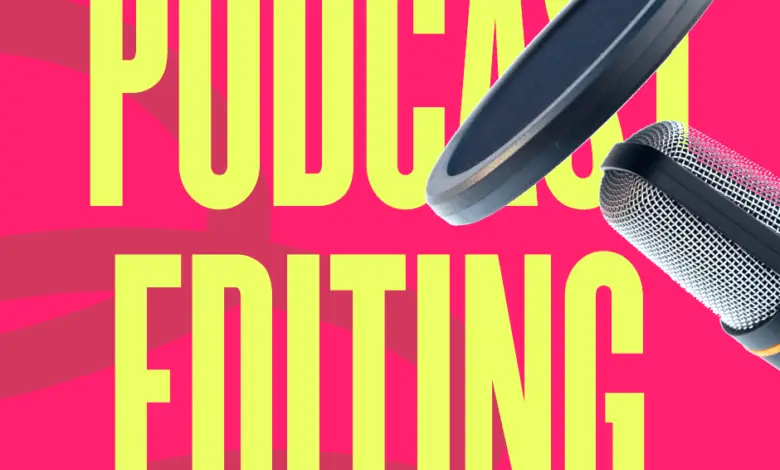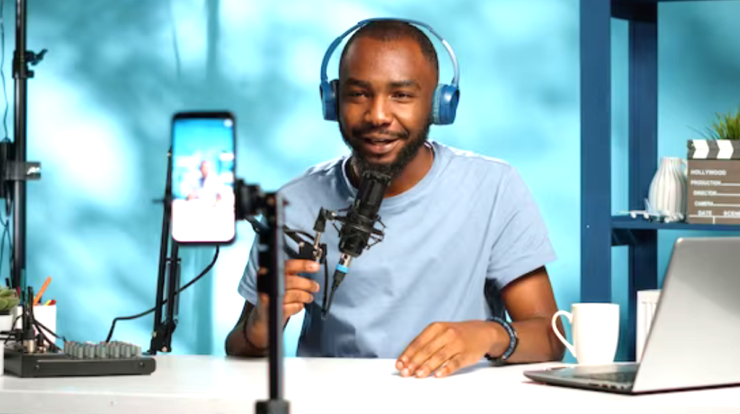Mastering the Craft: How to Become a Podcast Editor and Boost Your Career
10 Proven Steps to Become a Podcast Editor: Unleash Your Editing Potential

Become a Podcast: In recent years, podcasting has exploded in popularity, becoming one of the most accessible and engaging forms of digital media. As a result, there is a growing demand for skilled podcast editors who can transform raw audio recordings into polished, professional episodes. If you have a passion for audio, an ear for detail, and a desire to work in the exciting world of podcasting, becoming a podcast editor can be a fulfilling and rewarding career choice. In this article, we will guide you through the steps to becoming a podcast editor and how it can boost your career.

Develop Your Audio Editing Skills
To start your journey as a podcast editor, you need to hone your audio editing skills. Familiarize yourself with audio editing software such as Adobe Audition, Audacity, or GarageBand. Learn the basics of audio processing, including noise reduction, equalization, compression, and mastering. Practice editing audio clips to improve your speed and precision.
Consider taking online courses or tutorials dedicated to audio editing and production. These resources can provide valuable insights and help you refine your skills. Additionally, actively listening to a wide range of podcasts will help you understand different editing styles and techniques.
Build a Portfolio
Creating a strong portfolio is crucial to demonstrate your capabilities as a podcast editor. Start by offering your editing services for free or at a reduced rate to local podcasters, friends, or colleagues. Use these opportunities to gain experience and build a portfolio showcasing your work.
As you work on more projects, ask for feedback and testimonials from podcasters you’ve helped. A diverse portfolio that includes various genres and styles of podcasts will make you more attractive to potential clients or employers.
Networking
Networking is essential in the podcasting industry. Attend podcasting events, conferences, and meetups to connect with podcast creators, producers, and fellow editors. Online forums, social media groups, and platforms like LinkedIn can also be valuable for building your network.
Building relationships with podcasters and industry professionals can lead to job opportunities, collaborations, and referrals. Being part of a supportive community can provide guidance, mentorship, and exposure for your career.
Learn Podcasting Basics
While podcast editing is your primary focus, understanding the broader aspects of podcasting can be beneficial. Familiarize yourself with podcast hosting platforms, RSS feeds, metadata, and distribution channels. Knowing how the entire podcasting process works will make you a more valuable asset to podcasters.

Stay Updated with Industry Trends
The podcasting landscape is constantly evolving, with new technologies and trends emerging regularly. Stay informed by following industry news, listening to podcasts about podcasting, and subscribing to relevant blogs and newsletters. Being aware of the latest developments will help you adapt your skills and services to meet the changing needs of podcasters.
Offer Specialized Services
Consider offering specialized services that set you apart from other podcast editors. For example, you could become an expert in audio storytelling, sound design, or podcast marketing. Diversifying your skill set can make you a sought-after editor in a competitive market.
Market Yourself
To boost your career as a podcast editor, market yourself effectively. Create a professional website showcasing your portfolio, services, and contact information. Use social media platforms to share your work, engage with the podcasting community, and demonstrate your expertise.
Additionally, consider creating a podcast or YouTube channel where you discuss podcasting tips and tricks. This not only showcases your knowledge but also attracts potential clients and collaborators.
Seek Employment or Freelance Opportunities
Once you have built a strong portfolio and established your presence in the podcasting community, you can start seeking employment or freelance opportunities. Podcast production companies, media organizations, and individual podcasters often hire editors. Use your network and portfolio to find job listings and apply for positions that align with your goals.
Continue Learning and Growing
Podcast editing is an ever-evolving field, and to stay competitive, you must continue learning and growing. Consider taking advanced courses, attending workshops, and experimenting with new editing techniques. Staying dedicated to improving your craft will keep your career on an upward trajectory.
Conclusion
Becoming a podcast editor is a rewarding career choice that allows you to be an integral part of the creative process behind podcasts. By developing your skills, building a strong portfolio, networking with industry professionals, and staying updated with industry trends, you can elevate your career as a podcast editor and enjoy a fulfilling and prosperous journey in the world of podcasting. The power of podcast editing lies not only in the technical prowess but also in the ability to shape compelling narratives and bring stories to life through the medium of audio.
frequently asked questions (FAQs):
What does a podcast editor do?
A podcast editor is responsible for enhancing the audio quality of podcast recordings, removing background noise, adding music or sound effects, editing out mistakes or pauses, and ensuring that the final product is polished and professional.
Do I need formal education to become a podcast editor?
While a formal education in audio production or editing can be helpful, it’s not always necessary. Many successful podcast editors are self-taught or have learned through online courses and practical experience.
What software do podcast editors use?
Popular audio editing software for podcast editing includes Adobe Audition, Audacity, GarageBand (for Mac users), and Pro Tools. The choice of software often depends on personal preference and project requirements.
How can I find podcast editing clients or job opportunities?
You can find clients or job opportunities by networking within the podcasting community, attending industry events, joining online forums and social media groups, and showcasing your work on a professional website or portfolio.
What skills are essential for a podcast editor?
Essential skills for a podcast editor include audio editing proficiency, attention to detail, communication skills, time management, and creativity. Being able to understand and adapt to the podcast’s content and style is also important.
How can I build a strong portfolio as a beginner?
As a beginner, consider offering your podcast editing services to friends, local podcasters, or through freelance platforms at a reduced rate or for free to build your portfolio. Be sure to request feedback and testimonials from satisfied clients.
What’s the average income for a podcast editor?
Podcast editor incomes can vary widely depending on experience, location, and the complexity of the projects. Entry-level podcast editors may earn around $20 to $40 per hour, while experienced professionals can charge more, especially for complex and highly produced podcasts.
Are there any specialized areas within podcast editing?
Yes, podcast editing can have specialized areas such as sound design, audio storytelling, dialogue editing, and even podcast marketing. These specializations can help you stand out and offer additional services to podcasters.
How can I stay updated with industry trends in podcasting?
Staying updated with industry trends can be achieved by following podcasting news websites, listening to podcasts about podcasting, subscribing to industry newsletters, and participating in online communities where professionals share insights and updates.
What’s the future of podcast editing as a career?
The future of podcast editing looks promising, as the podcasting industry continues to grow. With more businesses and individuals starting podcasts, there will be a sustained demand for skilled podcast editors who can help produce high-quality content.



